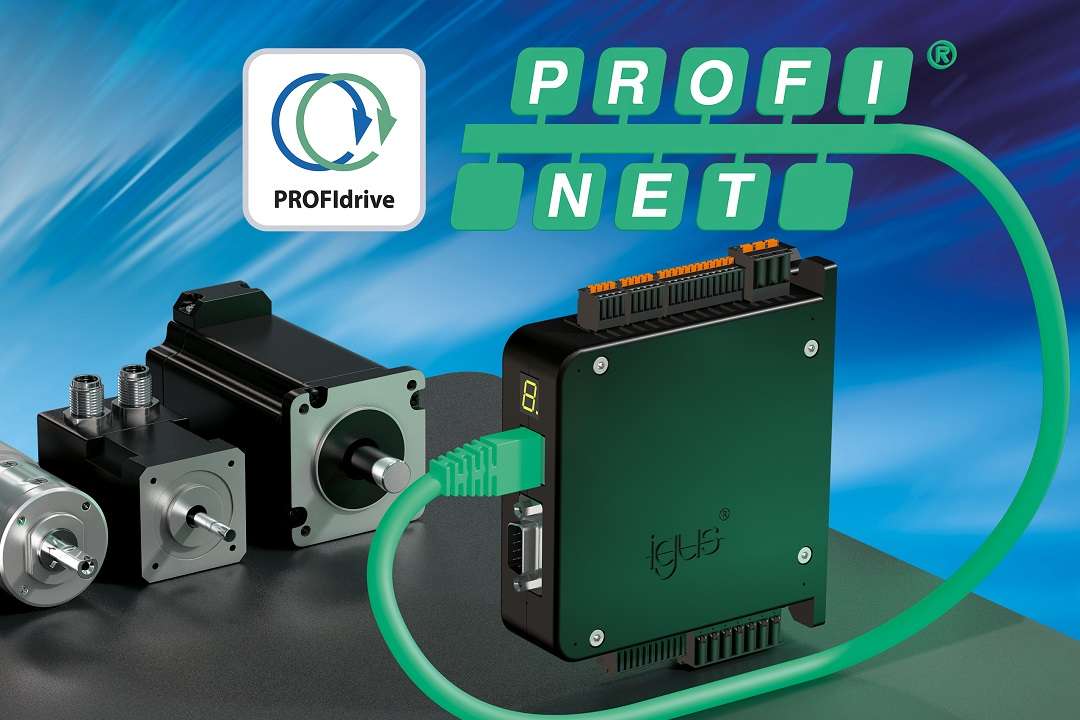igus increases the flexibility of its D1 motor control, which designers use for electric linear drives, handling systems and robot axes. It is now possible to integrate the D1 seamlessly and quickly into higher-level control systems from Siemens, Beckhoff, Wago and other manufacturers using Siemens-certified PROFINET – without time-consuming and complicated adaptations. This extended connectivity should significantly increase the performance and efficiency of automation processes.
The D1 motor control is the powerful and versatile solution from igus for demanding drive applications, and is now compatible with the industrial communication standard PROFINET/PROFIdrive. With a market share of around 23%, PROFINET is currently experiencing the strongest growth. Major manufacturers such as Siemens, Beckhoff and Wago use this industrial Ethernet standard for industrial automation as it makes real-time and reliable communication possible between control systems, machines and field devices such as sensors and actuators.
“Thanks to the PROFINET integration, communication between the D1 and these control systems is now completely straightforward,” says René Erdmann, Head of Business Unit drylin E Drive Technology at igus. “The extended connectivity eliminates the need for specialised software and in-depth technical knowledge. It is easy to embed into automation systems, shortens project times and reduces integration and maintenance costs.” The D1 with PROFINET fieldbus is available immediately. Users can also bring older models up to date with a free update.
Fast cycle times, intuitive operation and high system compatibility
Designers use the D1 motor control to operate stepper, DC and EC/BLDC motors of electric linear drives, handling systems and robot axes. “The D1 impresses with short cycle times, which ensures a fast response time of eight to 16ms, depending on the application. It offers great advantages, especially in dynamic applications,” says Erdmann. The intuitive operability via a web interface, on which positions, speeds, accelerations and movement profiles can be set without additional software is also popular with designers.
They also value the support of interfaces such as CANopen and Modbus TCP (gateway) to integrate the control system into existing automation environments. The D1 is suitable for a wide range of applications. Thanks to the AC1 speed control and AC3 positioning application classes, it can be used in various industrial sectors, from automotive production and packaging lines to simple robotics. “With the PROFINET/PROFIdrive integration, which has also been certified by Siemens, we want to offer design engineers an even more flexible and future-proof solution that further increases the performance and efficiency of their automation processes,” says Erdmann.
The dryve experience provides more information on the igus motor control systems and applications that have already been implemented applications as well as detailed tutorial videos of all functionalities and a guide for selecting the right motor control system. In addition, igus offers free sample programmes that significantly reduce the integration time of the motor control systems, which saves time and money.
igus GmbH develops and produces motion plastics. These lubrication-free, high-performance polymers improve technology and reduce costs wherever things move. In energy supplies, highly flexible cables, plain and linear bearings as well as lead screw technology made of tribo-polymers, igus is the worldwide market leader. The family-run company based in Cologne, Germany, is represented in 33 countries and employs around 5,200 people across the globe.
In 2024, igus generated a turnover of €1,105 billion. Research in the industry’s largest test laboratories constantly yields innovations and more security for users. 245,000 articles are available from stock and the service life can be calculated online. In recent years, the company has expanded by creating internal startups, e.g. for ball bearings, robot drives, 3D printing, the RBTX platform for Lean Robotics and intelligent “smart plastics” for Industry 4.0. Among the most important environmental investments are the “chainge” programme – recycling of used e-chains – and the participation in an enterprise that produces oil from plastic waste.







